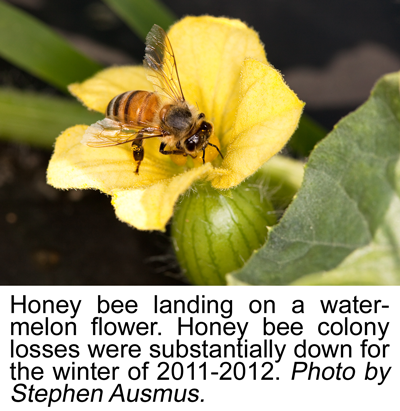By Kim Kaplan
May 31, 2012
WASHINGTON—Total losses of managed honey bee colonies from all causes were 21.9 percent nationwide for the 2011/2012 winter, according to the annual survey conducted by the U.S. Department of Agriculture (USDA), the Bee Informed Partnership and the Apiary Inspectors of America.
This represents a substantial drop in mortality compared to the previous five years, when winter losses of around 30 percent have been reported. Previous surveys found total colony losses of 30 percent in the winter of 2010/2011, 34 percent in 2009/2010, 29 percent in 2008/2009, 36 percent in 2007/2008 and 32 percent in 2006/2007.
The unusually warm winter during 2011/2012 could be one possible contributing factor to the decline in colony losses, although no direct scientific investigation of the weather connection has been conducted. January 2012 ranks as the fourth-warmest in U.S. history.
“A warm winter means less stress on bee colonies and may help them be more resistant to pathogens, parasites and other problems,” said Jeff Pettis, co-leader of the survey and research leader of the Agricultural Research Service (ARS) Bee Research Laboratory in Beltsville, Md. ARS is USDA’s chief intramural scientific research agency.
University of Maryland research scientist Dennis vanEngelsdorp was the co-leader of the survey.
Among beekeepers who reported losing any colonies from any cause, 37 percent said they lost at least some of their colonies without finding any dead bees. The absence of dead bees is one of the defining symptoms of colony collapse disorder (CCD), a serious problem that beekeepers began facing in 2006. Since this was an interview-based survey, it was not possible to confirm that these colonies had CCD or if the losses were the result of other causes that share the “absence of dead bees” symptom.
“Tracking CCD continues to be complex,” Pettis said. “Despite several claims, we still don’t know the cause of CCD.”
Almost half of responding beekeepers reported losses greater than 13.6 percent, the level of loss that beekeepers have stated would be acceptable for their operations. Continued losses above that level threaten the economic sustainability of commercial beekeeping.
A total of 5,543 beekeepers, who manage nearly 15 percent of the country’s estimated 2.49 million colonies, responded to the survey.
A complete analysis of the survey data will be published later this year. The abstract can be found here.
More information about CCD can be found here.
As USDA’s chief scientific research agency, ARS is leading America towards a better future through agricultural research and information. ARS conducts research to develop and transfer solutions to help answer agricultural questions that impact Americans every day. ARS work helps to:
- ensure high-quality, safe food, and other agricultural products;
- assess the nutritional needs of Americans;
- sustain a competitive agricultural economy;
- enhance the natural resource base and the environment; and
- provide economic opportunities for rural citizens, communities, and society as a whole.
